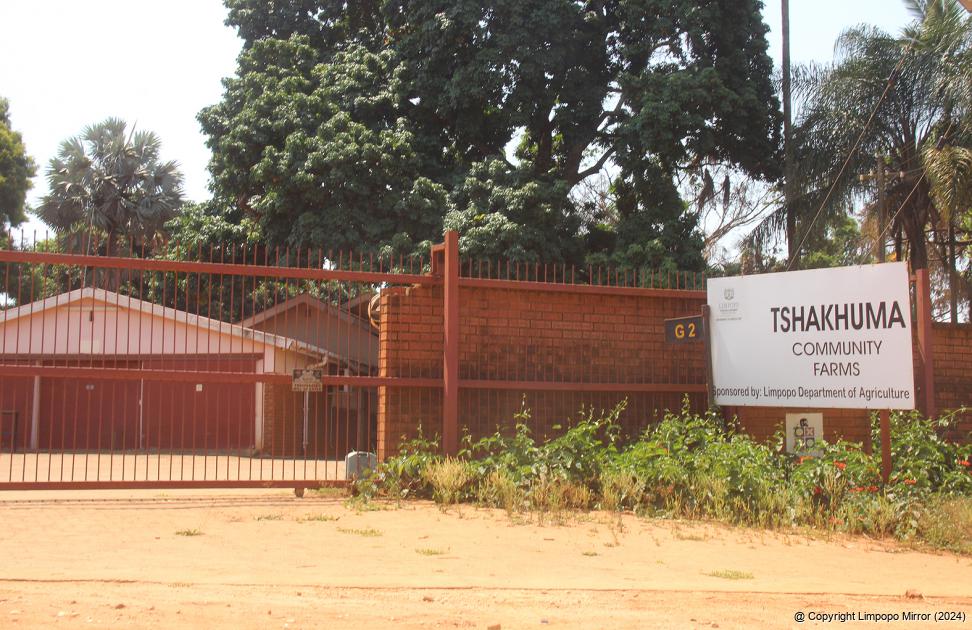

ADVERTISEMENT:

Tshakhuma Community Farms - on the verge of collapsing.
Community farms in crisis
More than 50 farm workers in the Levubu area stand to spend a bleak Christmas this year, following the recent collapse of seven farms that are part of Tshakhuma Community Farms.
The farms, part of 26 farms of the Tshakhuma Community Project in the Levubu farming area, were given back to their lawful owners through the government’s land restitution programme. The farms were handed back to the community after being bought for more than R67 million 10 years ago.
A random survey of the farms showed that most of the farms have not been doing well, compared to the white-owned commercial farms in the same area. Among other things, they lack electricity, which is used for irrigation purposes and offices. There is no fertilizer and no activity seems to be taking place in the farming area.
Workers have since stopped working, after their employer had allegedly failed to pay them their monthly salaries for some months now. They have since approached the CCMA for help.
The management of the farms blame all their woes on the government, which they said promised to fund them, “but did not keep up their promises”.
One of the affected workers, Mr Peter Muhanelwa (53) of Tshitavhadulu in Tshakhuma, said he started working at one of the farms in 2008 and initially things went well. “The situation changed in May this year, when we did not get our monthly salary. We were promised that we would get our pay the following month, as there were some challenges in the company. Come June, we still did not get our pay and what we got were only promises, and up until now we have not got our salaries.”
He added that the situation was depressing and saddening. “As as a man I am supposed to take care of my family, but nowadays I am even shy to go out of the house. I have lost my dignity as an unemployed person,” he added.
Muhanelwa put all the blame on the management, whom he alleges “are getting huge salaries, drinking coffee in their offices and doing nothing.” According to him, the affected workers should not blame the government for their woes. “Government gave us everything to start our businesses, but mismanagement of funds and lack of knowledge about the farming business led to the collapse of these farms.”
He said the feeling among the workers was that the government should take back the farms and lease them to farmers with expertise, while paying the landowners rent. “These farms could go back to their former state of production and not be white elephants as they are today,” he said.
Muhanelwa is presently cutting and selling grass that is used as fodder, because of the drought.
Another of the former employees, who preferred anonymity, said the present state had adversely affected them and their families. “Just have a look, Christmas is just at the doorstep and we do not have any money to spend with our families. There is no more time to go out looking for jobs and we will only wait for next year to go job hunting, while our bosses enjoy their Christmas with their families.”
Limpopo Mirror has reliably learnt that the farms are more than R900 000 in arrears to Eskom. Salaries for employees alone are said to be in the region of more than R700 000 per month.
Mr Adolph Madzivhandila, general manager of the farms, said the problem at the projects was more complex than what people thought. "Things went wrong a long time ago and when we came in, we did not have formal managerial qualifications, but as beneficiaries who have interest in the running of the projects. The projects cannot run without money, but we are happy there are consultations with the Department of Agriculture that hopefully will bear fruits and that the farms can run smoothly again," he said.
Date:27 November 2016
By: Elmon Tshikhudo
Elmon Tshikhudo started off as a photographer. He developed an interest in writing and started submitting articles to local as well as national publications. He became part of the Limpopo Mirror family in 2005 and was a permanent part of the news team until 2019.
Read: 5334

ADVERTISEMENT

ADVERTISEMENT:

ADVERTISEMENT:

Recent Articles
-

Vhagudiswa vha tshikolo tsha Fhetani vha khou fhaṱelwa muratho wavho wo tsireledzeaho
16 April 2024 By Khathutshelo Raliphaswa -

Holo ya musalauno i ḓuraho miḽiyoni ya malo wa dzi rannda yo netshedzwa kusi kwa Tshikhudini
16 April 2024 By Khathutshelo Raliphaswa -

Sport League Logs for 12 April 2024
15 April 2024 -

Vhamusanda Vha Lukhwarani vhari vha na mbonela phanḓa dza kusi kwavho.
15 April 2024 By Elmon Tshikhudo -

New Lukwarani leader may be blind, but has bright vision for his people
14 April 2024 By Elmon Tshikhudo

ADVERTISEMENT

Popular Articles
-

Leopards’ top striker dreams of playing for Kaizer Chiefs
22 March 2024 By Frank Mavhungu -

Well-known inventor, Prof Mulalo Doyoyo, dies
14 March 2024 By Victor Mukwevho -

Lesley Manyathela stadium remains a 'white elephant' to local clubs
23 March 2024 By Kaizer Nengovhela -

Murder suspect appears in Mutale Court
22 February 2024 By Victor Mukwevho -

Masindi case likely to introduce new era of customary law
24 February 2024 By Anton van Zyl -

Mukondeni's field of dreams has turned into a nightmare
17 February 2024 -

Many questions as man shoot himself in the head
15 March 2024 By Elmon Tshikhudo






